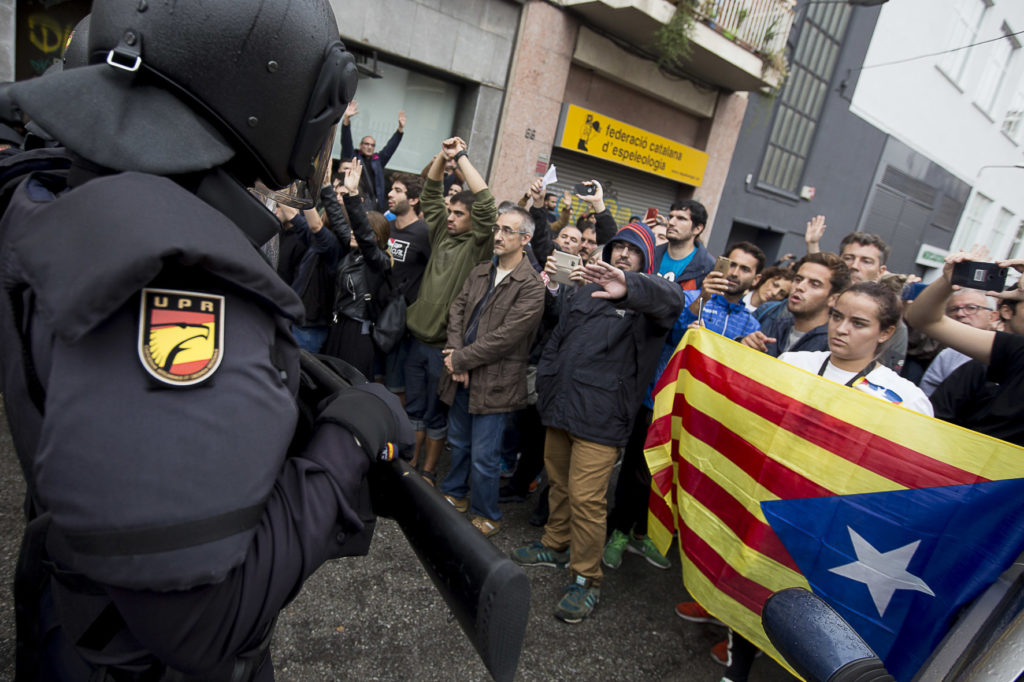05.07.2019 - 09:02
|
Actualització: 05.07.2019 - 11:02
Last Tuesday at the European Parliament’s opening session I was taken aback by how only two problems cropped up openly and in public: Brexit and the conflict between Catalonia and Spain. Indeed, there were many references to the shameful wall on the Mediterranean and Julian Assange’s arrest, among other issues that are also exceedingly serious. But the Brexiteer MEPs’ uncouth gesture and Matt Carthy’s address in support of the three Catalan representatives set the tone for the sitting.
Allow me to refer to the work of Sheldon Wolin, one of America’s greatest political theorists, to try to explain the significance and the importance of it all, in my view. The furious pace of day-to-day politics means it is a good idea to make a stop and recap. In this instance, I would like to review the current state of affairs by using two basic ideas theorised by the Berkeley, Oxford, Cornell and Princeton professor, who was a keen follower of Hannah Arendt and is a key figure in the criticism of capitalism from a non-Marxist standpoint. You will find his Wikipedia entry here.
The two concepts that I would like to get across to you are “inverted totalitarianism” and “fugitive democracy”. Both concepts perfectly account for what happened in Catalonia on October 1st and 3rd 2017, as well as the significance of Brexit. They also explain the ongoing effect that these two events are having on the consolidation of today’s EU project.
Both concepts are entwined. According to Wolin, the system we are living in is not a democracy, but an “inverted totalitarian” system. In a classic totalitarian system, such as the dictatorships we saw between the 1930s and the 1970s, the State is seized by a totalitarian party that wields its power to rule over a country’s social and political life. In contrast, inverted totalitarianism is when the State is seized by the economic elite, which turns citizens into consumers and rules over politics and society thanks to media and the political parties.
In a traditional totalitarian system, the dictator’s charisma is the key element. In inverted totalitarianism there are neither dictators nor politicians, merely commodities to be sold during election time. They engineer them and eventually toss them away. It makes no difference. France’s Macron and Spain’s Albert Rivera are two names who were clearly cast to play a certain part. PM Pedro Sánchez, too. That’s why an election is no longer a face-off between two projects, but a personality contest.
In traditional totalitarianism, democracy is explicitly rejected. In contrast, inverted totalitarianism employs democracy to attain a veneer of legitimacy, provided democracy can’t actually be put to use. Here I ought to mention Ivan Krastev’s theories about the EU, who argues that the EU is a postmodern form of fascism that operates under the guise of a democratic system but, in actual fact, it is run by unelected politicians who keep up a charade by allowing us to elect national leaders whose hands are tied by the European Union itself. You may elect Tsipras, but Tsipras can do nothing.
Let’s head back to Wolin. Inverted totalitarianism, the system we are living in, accepts democracy only as a nagging nuisance that one must put up with. The rituals of a democracy are adhered to as a means of legitimising the construct, but people are encouraged to forfeit politics, particularly by media. When Churchill lost the elections after WWII, he joked about how democracy would be the perfect system, were it not for the fact that people are allowed to vote as they please. That’s what they have learnt now and it is precisely what they are trying to avoid. Classic liberals like Winston Churchill would be up in arms, if they could see what their alleged followers get up to nowadays.
When we explain that the IBEX-35 —the stock index that lists Spain’s top corporations— rules over Spain’s public life by means of the tv duopoly and by controlling the vast majority of political parties, which are increasingly marketing products rather than ideology spheres, we are effectively proving the theories that Wolin had developed until he passed away in 2015. Evidence of that is his definition of the contemporary state, which perfectly fits the reality we are experiencing today on a daily basis:
“It is an administrative and penetrative state whose tentacles are everywhere and on everyone, especially the most disempowered; they do not honour public/private distinctions, political/economic distinctions, or even legal/extra-legal distinctions (…) The contemporary state is a complex amalgam of political, economic, administrative and discursive powers”.
Unlike other thinkers, Wolin does not offer a recipe for mending the situation he so bitterly describes. However, he knows and appreciates the existence of a “fugitive democracy”, a concept that us Catalans should be particularly fond of.
It is a mighty concept. According to Wolin, the sort of democracy that we have in our countries is not real because politicians —and to an even lesser extent, corporations— cannot be held to account by the people. Our form of democracy is a ritual, yet there are times when true fugitive democracy suddenly raises its head and breaks on through. There are times when, starting off with a disruptive event that exposes the people’s dissatisfaction with the life that’s been handed to them, an event that threatens the elite and shatters their plans, societies burst open and come together, for a few hours or days, for the sake of the population at large and their common interests. Fugitive democracy emerges right when the elite loses its grip, which generally can only happen following a grassroots process and using a springboard, a means which inverted totalitarianism cannot dismiss right off the bat because it needs to pretend it believes in democracy.
Regardless of who voted Leave, that’s what Brexit was about, like many authors such as James Hodgson —a real eye-opener for me— have pointed out. Likewise, that’s what October 1st and 3rd clearly were. The analysis is so fitting that Wolin goes as far as to warn that the extent of the disruption will even frighten the elite of the fugitive democracy, as happened with president Puigdemont’s cabinet.
I’ll wrap up soon. Wolin does not offer a recipe for victory. He notes that fugitive democracies are very difficult to sustain because people have ordinary life interests that prevent them from remaining forever mobilised, but also because the nature of a democratic revolution is such that it fosters diversity and, inevitably, brings about fragmentation.
We have witnessed impressive outbursts of fugitive democracy in recent years that look as if they have all but faded away: the Arab Spring is a case in point. And others seemed to be over for many years, but suddenly got a second wind, such as Hong-Kong’s democratic uprising. We have seen fugitive democracy push a state against the ropes, only to become all appearance and no substance, like France’s gilet jaunes. Some fugitive democracies have eventually been taken over by a segment of the elite, who have domesticated them, as happened with the 15-M Indignados movement in Spain.
What sets Catalonia’s independence movement apart is its tremendous resilience over a long period of time. There is also an attempt by the movement’s own elite —be it Esquerra or Junts— to straitjacket the Catalan democratic, grassroots movement. But so far it has failed owing to the people’s astounding capacity for self-sacrifice, but also because Spain undermines its own efforts by leaning on and persecuting a section of the secessionist elite with whom they might have come to an understanding. Instead, they have driven them to a no-holds-barred fight.
Spain’s catastrophic error brings about one of the two conditions that Wolin describes as necessary to prolong a fugitive democratic outburst in the streets and allow it to bear fruit: the system’s disruption must be of such magnitude that, in order to thwart it, the state has no choice but to bring back classic totalitarianism, adopting despotic, tyrannical measures that will eventually debase its legitimacy, as it edges closer and closer to a dictatorship with every passing day.
Wolin’s second condition to extend the democratic outburst is not formulated in strictly scientific terms, but it is profoundly intuitive and I am particularly fond of it. He simply states that, an event like Catalonia’s independence referendum on October 1 2017 exerts such a powerful influence on people, it represents such a far-reaching emotional change, that “it might happen again for as long as there are people who are able to remember it”. Once we have experienced true democracy and we have realised it is a true possibility —and a beautiful one—, we want to bring it back.
That’s why, even if part of the secessionist elite is using October 1st merely as a symbol without really meaning to bring it back, returning to what we did in October 2017 is the only passable road, the one path we can follow and must keep to. And that’s why the crisis between Spain and Catalonia, the Catalan example, is so far-reaching for the EU, which is presently the perfect embodiment of inverted totalitarianism on a global scale. Isn’t it true that it is precisely in the EU’s peculiar institutions where the idea of removing the economy from political oversight and politics from the people’s scrutiny is making the most headway?


